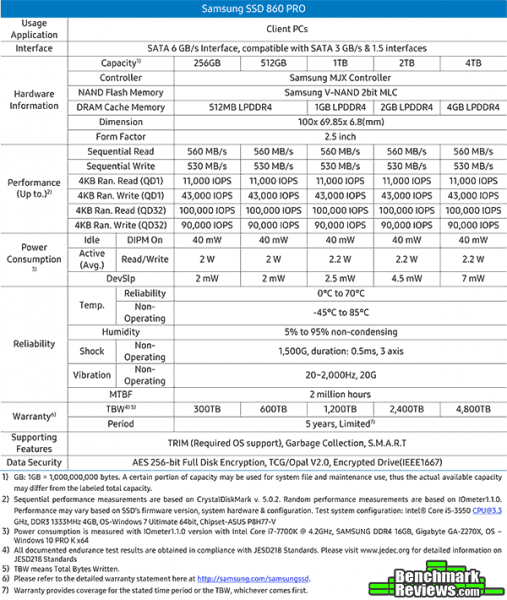PAGE INDEX
Samsung SSD 860 PRO 1TB Review
By Olin Coles
Manufacturer: Samsung Electronics Co., Ltd.
Product Name: 860 PRO Solid State Drive
Part Number: MZ7KH1T0HAJR
Model Number: MZ-76P1T0 (MZ-76P1T0BW)
UPC: 887276247441 EAN: 8801643075392
Price As Tested: $379.99 (Amazon | Newegg)Full Disclosure: The product sample used in this article has been provided by Samsung.
Planar NAND allowed manufacturers to offer speedy solid state storage at fair price, while Samsung’s recently announced 860 EVO SSD improved upon this with their latest 3-bit MLC V-NAND flash technology. In this article, Benchmark Reviews tests the 1TB Samsung SSD 860 PRO, which utilizes 64-cell layer 2-bit MLC V-NAND for high endurance and improved sequential performance to produce up to 560 MB/s reads at 100,000 IOPS and 530 MB/s writes at 90,000 IOPS, and compare SATA 6 GB/s performance against the all the leading competition.
It’s been more than three years since Samsung last released a solid state drive for the SATA 6GB/s interface, which we covered in our 850 EVO and 850 PRO SSD reviews. The primary difference hardware between then and now is their 64-cell layer V-NAND architecture, which delivers twice as much capacity per IC. This allows Samsung to offer their new 860 PRO in capacities up to 4TB. That same improvement also doubles reliability, as the Total Bytes Written (TBW) jumps from 150TB for the 512GB 850 PRO to 600TB for their new 860 PRO.
If you’ve kept up with technology news, you might have been misled into believing the SATA 6Gb/s interface was made obsolete by speedy M.2 2280 form factor on the PCIe 3.0 interface. This is not true. The Samsung 860 PRO is a 2.5″ solid state drive made for the SATA 6Gb/s interface, which is still widely utilized by most desktop computers and notebook PCs. The Samsung 860 PRO series accommodates SATA, mSATA, and M.2 interfaces.
Samsung 860 PRO Specifications
Bandwidth Speed vs Operational Performance
Solid State Drive performance revolves around two dynamics: bandwidth speed (MB/s) and operational performance I/O per second (IOPS). These two metrics work together, but one may be more important than the other depending on the workload. Consider this analogy: bandwidth determines how much cargo a ship can transport in one voyage, and operational IOPS performance is how fast that ship moves back and forth. By understanding this and applying it to SSD storage, there is a clear importance set on each variable depending on the task at hand.
For casual users, especially those with laptop or desktop computers that have been upgraded to use an SSD, the naturally quick response time is enough to automatically improve the user experience. Bandwidth speed is important, but only to the extent that operational performance meets the minimum needs of the system. If an SSD has a very high bandwidth speed but a low operational performance, it will take longer to load applications and boot the computer’s Operating System than another SSD that offers higher IOPS performance.







Most Recent Comments